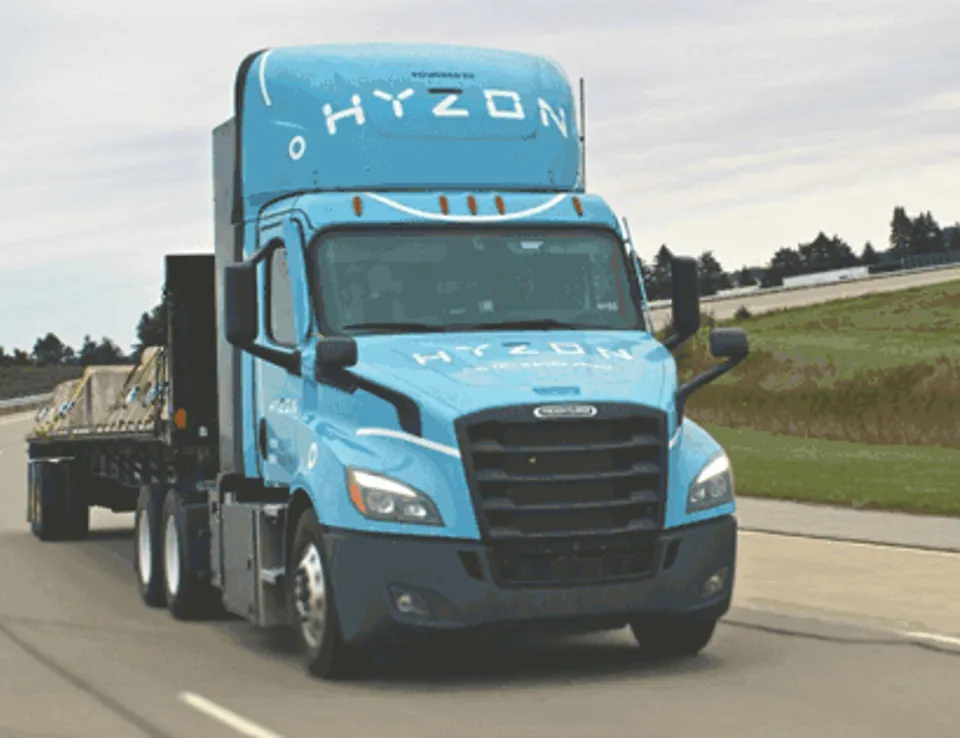
14 September 2021
Study reveals Mexico’s great potential for driving green shipping fuel production
Mexico’s potential for renewable energy generation, the location of its ports on busy shipping routes, and strong trading relations make the country well suited as a zero-carbon shipping fuel hub. Effective regulation could make such fuels commercially viable within the decade.
Mexico is well-positioned to build a valuable zero carbon shipping fuels sector, as it has an abundance of renewable energy potential along with direct access to busy shipping routes. This is according to a study conducted by Ricardo and Environmental Defense Fund for the P4G Getting to Zero Coalition Partnership. The production of green hydrogen-derived shipping fuels could help Mexico meet its decarbonisation targets by catalysing renewable energy generation supply chains, skills, and economies of scale, which support the wider adoption of new technologies.
Well-placed countries like Mexico will only reap the benefits if governments and the shipping industry coordinate efforts for effective climate regulation to expedite the provision of fuels and infrastructure. The study explores the economic and environmental potential for the implementation of zero carbon shipping fuels through the shipping sector of Mexico. 
“Our study has found that Mexico’s access to busy shipping routes and abundant renewable energy potential puts it in a good position to help drive the zero carbon fuel market. Mexico can potentially supply both its domestic electrical demand as well as the production of zero carbon fuels to supply commercial vessels bunkering in its ports by use of renewable energy,” says Olivia Carpenter-Lomax, Future Energy Specialist and Project Lead, Ricardo.
The maritime shipping sector is on the threshold of a transition to zero emissions. Within the next decade, the shipping industry will start to replace traditional heavy bunker fuel with new zero carbon shipping fuels generated from renewable energy to meet its decarbonization targets.
“The shift towards zero carbon shipping needs to accelerate within the next decade and effective regulation will also create opportunities for countries to catalyze and benefit from this necessary transition. By moving early, Mexico can become a central actor in supplying the global demand for green fuel and attract investment of 7-9 billion USD by 2030,” comments Panos Spiliotis, Global Climate Shipping Manager, Environmental Defense Fund.
“The study emphasizes the potential that Mexico has in the production of zero carbon shipping fuel. Shipping’s future demand for zero carbon fuels will allow for increasing export and can provide a constant long-term revenue stream, which is an attractive feature for investment and can help Mexico reach its emission targets as well as create new green jobs,” says Alfredo Gonzalez, Head of the 2030 Agenda at the Economy Secretariat.
The report finds that the geographical location, economic status and strong trading relations put Mexico in a favorable position to help drive the zero carbon fuel market and supply a growing global demand.
“Mexico’s access to busy trading routes has made it a major trading hub. This makes Mexico an advantageous location to establish a zero carbon shipping sector, as the many international vessels bunkering in Mexican ports need to be able to refuel along their journey,” states Ingrid Sidenvall Jegou, Project Director, Global Maritime Forum.
The abundance of renewable energy resources in Mexico means that shipping fuels can be derived from renewable electricity generation. The study reveals that several zero carbon fuels have the potential to be used to decarbonize maritime shipping.
“The study has identified hydrogen and ammonia as the most suitable options for large commercial vessels such as tankers, containers and bulk carriers, while small vessels such as port service vessels can be supplied through electrification. The renewable energy potential along with the advantageous locations of ports gives Mexico the opportunity to play a crucial role in driving the zero carbon shipping fuel transition,” says Dr. Santiago Suarez De La Fuente, Lecturer in Energy and Transport, UCL Energy Institute.
“From the study it becomes evident that Mexico may benefit in various ways from carrying a zero carbon shipping fuels sector. Apart from ensuring that the country reaches its wider decarbonization goals, locally deployed renewables can also create energy security and help catalyze the low carbon economy in Mexico by supporting decarbonization of other sectors, creating a wide range of jobs,” states Pedro Gomez, Head of Shaping the Future of Mobility, Member of the Executive Committee, The World Economic Forum.
For shipping to address its climate problem, it is crucial that governments and the global shipping sector coordinate efforts to ensure the availability of green fuels and infrastructure, and standards should be to encourage the zero-emission transition of both vessels and ports. International vessels adopting zero carbon fuel bunkering must have the opportunity to refuel along their journey. By moving early, Mexico can set the trend for electro fuel adoption and position itself as an important hub along global zero carbon shipping routes.
“With the recent IPCC report, it is evident that urgent action is needed to bring down greenhouse gas emissions. The growing demand for zero emission shipping solutions provides opportunities for shipping nations like Mexico to take a leadership role in catalyzing change that can be replicated by countries. The transition to zero emission shipping fuels is not only critical for the shipping industry but will also have decarbonization effects across other sectors including food loss and waste and green hydrogen. These are the kinds of cross-sectoral solutions P4G champions and that are needed to reach a net zero future for all,” comments Ian de Cruz, Global Director, P4G.
The report highlights the Ports of Manzanillo, Cozumel and Coatzacoalcos as great examples of how different types of ports in Mexico could capitalize on a zero carbon transition. Apart from meeting decarbonization targets, the transition would diversify current port activities and create a hub for the production and export of zero carbon fuels.
This study is part of the P4G Getting to Zero Coalition Partnership, spotlighting the potential of regional hubs to pioneer zero-carbon shipping fuel development in Mexico, South Africa, and
Indonesia.
Download the full report: Mexico: fuelling the future of shipping – Mexico’s role in the transformation of global shipping through green hydrogen-derived fuels.
About the Getting to Zero Coalition
The Getting to Zero Coalition, a partnership between the Global Maritime Forum, Friends of Ocean Action and World Economic Forum, is a community of ambitious stakeholders from across the maritime, energy, infrastructure and financial sectors, and supported by key governments, IGOs and other stakeholders, who are committed to the decarbonization of shipping. The ambition of the Getting to Zero Coalition is to have commercially viable zero emission vessels operating along deepsea trade routes by 2030, supported by the necessary infrastructure for scalable net zero-carbon energy sources including production, distribution, storage, and bunkering.
About P4G
P4G – Partnering for Green Growth and the Global Goals 2030 - is a global delivery mechanism pioneering green partnerships to build sustainable and resilient economies. P4G mobilizes a global ecosystem of 12 partner countries and 5 organizational partners to unlock opportunities for more than 50 partnerships working in five SDG areas: food and agriculture, water, energy, cities and circular economy.
About the Global Maritime Forum.
The Global Maritime Forum is an international not-for-profit organization dedicated to shaping the future of global seaborne trade to increase sustainable long-term economic development and human wellbeing.
About Friends of Ocean Action
Friends of Ocean Action is a unique group of over 55 global leaders from business, international organizations, civil society, science and academia who are fast-tracking scalable solutions to the most pressing challenges facing the ocean. It is hosted by the World Economic Forum in collaboration with the World Resources Institute.
About the World Economic Forum
The World Economic Forum is the International Organization for Public-Private Cooperation. The Forum engages the foremost political, business, cultural and other leaders of society to shape global, regional and industry agendas. It was established in 1971 as a not-for-profit foundation and is headquartered in Geneva, Switzerland. It is independent, impartial and not tied to any special interests.
About Environmental Defense Fund
Environmental Defense Fund Europe is an affiliate of Environmental Defense Fund (EDF), a leading international non-profit organisation that creates transformative solutions to the most serious environmental problems. Since 1967, EDF has used science, economics, law and innovative private-sector partnerships to bring a new voice for practical solutions.
About University College London Energy Institute
University College London Energy Institute Shipping Group aims to accelerate shipping transition to an equitable, globally sustainable energy system through world-class shipping research, education and policy support. The group specialises in multi- disciplinary research anchored in data analytics and advanced modelling of the maritime sector.
About International Association of Ports and Harbors
The International Association of Ports and Harbors (IAPH) was formed in 1955 and over the last sixty years has grown into a global alliance representing over 180 members ports and 140 port related businesses in 90 countries. The principal aim of IAPH revolves around promotion of the interests of Ports worldwide, building strong member relationships and sharing best practices among our members.
About Ricardo
At Ricardo, our vision is to create a world where everyone can live sustainably: breathing clean air, using clean energy, travelling sustainably, accessing clean water and conserving resources. Adopting zero carbon shipping fuels would bring the world closer to these ideals. Since the 1950s, Ricardo has worked to deliver improvements in air quality and pioneered the use of renewable energy technologies. We are currently working on the implementation of the Paris Agreement on climate change, helping countries to realise their plans for reducing greenhouse gas emissions.




 Follow Ricardo plc for regular updates
Follow Ricardo plc for regular updates




